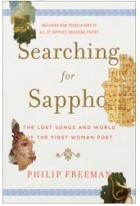 Freeman, Philip. Searching For Sappho: The Lost Songs and World of the First Woman Poet. W.W. Norton & Co., 2016. 336 p. HC. $26.95. ISBN 978-0393242232.
Freeman, Philip. Searching For Sappho: The Lost Songs and World of the First Woman Poet. W.W. Norton & Co., 2016. 336 p. HC. $26.95. ISBN 978-0393242232.
The words “sapphic” and “lesbian” are in common usage, but some folks still may not realize they spring from “Sappho” and “Lesbos.” So then who or what were they? This fine book offers some answers. With his intriguing and well-written combination of literary criticism, archeological mystery, and classical history primer, Freeman brings us a new look at an amazing woman with undeniable influence.
Very little is actually known about Sappho, who was born on the island of Lesbos sometime between 630 and 612 BC and who likely died around 570 BC. Her birth family was wealthy, and evidence reveals she was married and gave birth to a daughter. Sappho was also exiled to Sicily at one time, but eventually returned to Lesbos, where she died.
Along the way, Sappho wrote some of the most beautiful poems in literary history, verses that Freeman characterizes as “deeply personal, celebrating the joys and agony of the human heart,” including many that indicate that she also loved women, emotionally and sexually.
While she reportedly composed “nine scrolls” worth of poems, only around 190 are available for study, and many of those are mere fragments, only a handful of words or phrases. However, archeological discoveries of “lost” Sappho works continue apace, and the author shares the intellectual excitement involved in the quests for such remarkable bounty.
Freeman blends as thorough a biography of Sappho as is possible under the circumstances with illuminating background on Greek society and customs during her lifetime. He also quotes copiously from her poetry and that of her contemporaries, and devotes an entire chapter to her same-sex themes. As a further bonus, Freeman includes an appendix with the texts of every Sappho poem currently available to scholars, even if a given piece consists only of a few words and many ellipses.
This book may have a limited audience, but Freeman does a fine job in offering readers what is currently known about Sappho and also why it is important she remain on our literary radar. It is recommended for both LGBT biography and literary criticism collections, and especially for readers with a strong interest in classical Greek history.
Cathy Ritchie
Acquisitions/Selection Services
Dallas (TX) Public Library